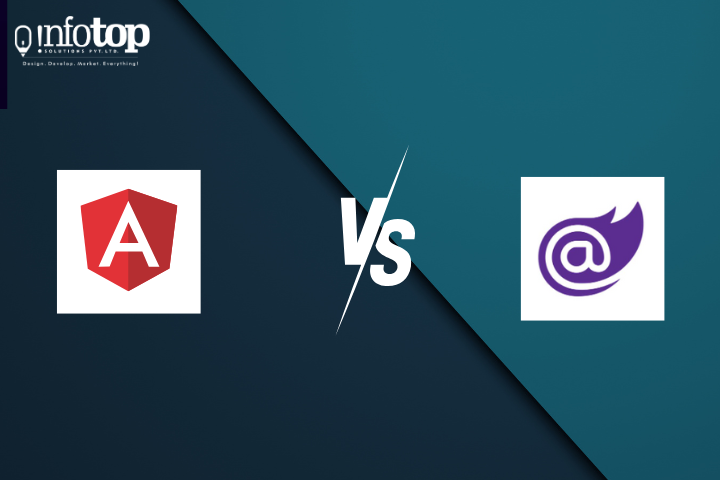
JavaScript, originally a browser language, has evolved into a popular programming language in various industries. The Stack Overflow Report 2023 reveals that 63.61% of developers favour JavaScript. However, amidst the rapidly changing web development scene, developers can now freely explore alternative options for their web app projects and are no longer constrained solely to JavaScript. Currently, when selecting a technology for your web development services, you must decide between two robust options – Blazor and Angular. Moreover, they are emerging as subjects of debate, engaging in cutthroat competition within the web development market. Explore the comparison of Blazor vs Angular to make an informed choice.
So, let’s engage in this discussion, examining both frameworks individually to compare and determine which one best suits your web application development needs!
What Is Blazor?
Microsoft’s Blazor, an open-source web development framework, delivers speed, reliability, and high effectiveness. It supports both client-side and server-side applications through the Blazor WebAssembly and Blazor Server hosting paradigms.
The acceptance of Angular web app development and the launch of Microsoft’s Blazor web development framework are attributed to the rise of single-page applications. Blazor, among the latest web development frameworks, empowers developers to create online apps using HTML and C#. With the Blazor web framework, developers can write C# code for browsers, compatible with Microsoft’s ASP.NET Core.
You can develop single-page web applications using .NET. Blazor enables you to construct browser-based apps by integrating C#, Razor syntax, HTML, and CSS.
Features of Blazor
- There are no restrictions on using HTML/CSS.
- Server-side pre-rendering speeds up initial loading.
- Virtualization enhances performance and scalability.
- Lazy loading optimizes page loading times
- Availability of SignalR as NuGet package
- Razor class libraries for code sharing
- Better virtualization
- Communication with gRPC-Web
What Is AngularJS?
Google develops and maintains Angular, a popular front-end framework. It is used to construct dynamic, modern web applications, emphasizing performance, scalability, and developer productivity. Initially launched in 2024, Angular has emerged as one of the most extensively adopted frameworks for creating single-page applications (SPAs). It employs TypeScript as its primary language and incorporates numerous features like dependency injection, reactive programming, and component-based architecture, furnishing developers with a robust toolset for crafting intricate web applications.
Features of Angular
- Dependency injection
- Component-based architecture
- Codeless development
- Deep linking
- Data binding
Comparing Blazor vs Angular in detail in 2024
When comparing Blazer and Angular, it’s crucial to consider the strengths and weaknesses of each framework. While both frameworks are popular choices for building web applications, they exhibit distinct differences that may render one more suitable for a specific project than the other.
1. Coding Time
In terms of build and coding time, Angular is renowned for its steep learning curve. It features a complex folder structure and demands familiarity with TypeScript and other tools like CLI, which can overwhelm beginners. Conversely, Blazor utilizes familiar technologies like C# and .NET Core, simplifying the initiation process for .NET developers.
2. PWA Support
The popularity of Progressive Web Applications (PWA) is rising as they offer a native app-like experience on the web. Angular includes built-in support for PWA, simplifying the development process for such applications. Conversely, Blazor lacks native support for PWA, but there are workarounds and third-party libraries accessible to developers.
3. Community Support and Resources
Angular benefits from a well-established community with abundant resources such as tutorials, guides, and forums. This is attributed to its more extended history and user base than Blazor. However, as Blazor’s popularity rises, its community also expands rapidly. Microsoft provides official documentation and support for Blazor, facilitating developers in finding solutions to any issues they encounter.
4. Async Nature
Angular adheres to a strict asynchronous model, which can enhance performance and scalability. Conversely, Blazor defaults to synchronous DOM updates, potentially resulting in slower rendering times for complex applications.
5. UI Building Tools
Both Angular and Blazor offer their UI-building tools. Angular features the well-known Material Design library, while Blazor provides its own component library, Radzen. These tools significantly streamline the creation of complex user interfaces in both frameworks.
Read More: What Is the Significance of Cross-Cultural Design in Web Development?
6. App Creation and Deployment
Because it operates as a client-side framework, Angular necessitates the utilization of a server for hosting and deployment. In contrast, Blazor can be deployed as a standalone application without relying on a server, simplifying the deployment and maintenance process.
Which Prevails: Blazor versus Angular in Web Development?
Both frameworks offer unique advantages in the ongoing debate between Blazor vs Angular for dominance in web development. While Blazor appeals to software development companies in India with its seamless integration with .NET technologies, Angular’s robust ecosystem and community support remain formidable. Ultimately, the choice between Blazor and Angular depends on the specific requirements and preferences of the development team and project. As a leading software development company in India, Infotop Solutions can guide you in making the right decision based on your business needs and goals. Contact us today to learn more about how we can elevate your next web development project to success!
